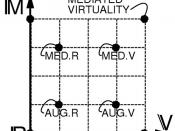What Price Knowledge? In my opinion there should be a limit to the lengths science can go for research. I don't agree with the concept of knowledge at all costs. The limits should be based on the area being studied, the subject being researched, and its impact and importance on society. In other words, does the end justify the means? Some subjects I feel have greater impact on society than others. Many medical advances were the result of research studies conducted using animals or human subjects. Joseph Lister, for example, did work with antiseptics. He discovered the reason why so many people were dying after surgery. Another very important medical advance was the development of the small pox vaccine, which saved many people's lives and eradicated the disease. Another example of scientific research having an impact on humans is shown by technological advances. A major invention that is still used today is the telephone.
Alexander Graham Bell, inventor of the telephone, made many people's lives easier. People could now talk to others over great distances in a matter of seconds rather than the weeks or sometimes months it would take for letters to be delivered. Another outstanding invention was the computer. This invention has a great impact on modern life whether we are aware of it or not While some areas don't require testing on humans or animals, like technology, some areas do, like medicine. Without animal testing some major strides in medicine would not have been achieved, such as vaccine development, antibiotic development, open heart surgery, diabetes research, hypertension treatment, anitulcer drug development, and organ transplants. However, I feel no matter what the outcome of the research all animal experimentation should be conducted as humanely as possible. I don't feel any animal should suffer needless pain, or mutilation. Ideally,


